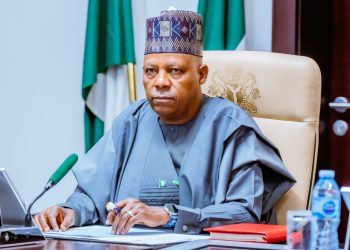The Inspector General of Police, Mr. Solomon Arase, early last week at a three-day training workshop organised by the United Nations Office on Drugs and Crime in Abuja, disclosed that the Nigeria Police Force paid over N1 billion, apparently as judgement debt or compensation, to Nigerians whose rights police officers and men trampled on in the last three years. “The Challenge of Policing in an Emerging Democracy: Entrenching Human Rights-based Approaches to Use Force and Firearms by Nigeria Police Officers” was the theme of the training. Arase acknowledged the fact that ‘Police’ Force Order 237, on which the police rely to kill recklessly in the guise of law enforcement and protection of life and property, has not only come under intense local and international criticisms, but constitutes the main root of legal actions against the nation’s police establishment.
Force Order 237 empowers the police to use firearms under the following circumstances, namely: (a) When a police officer is attacked and his life is in danger and there is no other way of saving his life. (b) When defending a person who is attacked and he believes on reasonable ground that he cannot otherwise protect him from death. (c) When necessary to disperse rioters or to prevent them from committing serious offences against lives and property. (d) If he cannot by any other means arrest a person who, being in lawful custody, escaped and take flight in order to avoid rearrest, provided the offence with which he is charged or has been convicted of is a felony or misdemeanour. (e) If he cannot by any other means arrest a person who takes flight in order to avoid arrest provided the offence is such that the accused may be punished with death or imprisoned for seven years and above.
Before, during and even after the three year, fruitless constitutional amendment exercise the 7th National Assembly embarked on between 2012 and this year, countless civil society groups and rights activists in the country and overseas have remained consistent in their agitation for the repeal of Force Order 237. Notwithstanding its objectionable position and seeming bias on happenings between the Nigerian Armed Forces and insurgency crisis management in the country, Amnesty International, in a December 2009 report, following claims of mass burial of men killed by the Nigeria Police, whose corpses were dumped at the University of Nigeria Teaching Hospital in Enugu State, drew attention to how Force Order 237 encouraged extra judicial killings. Erwin van der Borght, the group’s Africa Programme Director, did say then: “Force Order 237 is so impermissibly broad. It simply gives police officers permission to shoot people. It is against international standards and is being abused by police officers to commit, justify and cover up illegal killings”.
Nigeria-based International Society for Civil Liberties and the Rule of Law also told the 7th NASS that Force Order 237 “is… backed by relevant subsections of Sections 33 and 35 of the (1999) Constitution. These subsections are in conflict with their mother sections and inconsistent with the African Charter on Human and Peoples’ Rights, the Universal Declaration of Human Rights, the International Covenant on Civil and Political Rights, the UN Declaration of Basic Principles of Justice for Victims of Crime and Abuse of Power, the Basic UN Principles for the Use of Firearms by the Law Enforcement Personnel and the UN Code of Conducts for the Law Enforcement Officers, all of which Nigeria has either signed, ratified or domesticated”.
It is a common experience in the country seeing the police and armed forces personnel employing excessive and deadly force, including extra-judicial killings, as law enforcement strategies or to contain minor security breaches. Though improvements are being reported, the human rights records of the police are still nondeserving of a pass mark; what with legion egregious examples to draw from. All this culminate in the very strong suggestion that a lot more training work is required to redirect the culture of impunity away from the Nigeria Police and replace same with civilized conduct and respect for human rights in line with international best practice under a democracy. The IGP agrees that a policy vacuum exists on how and when firearms may be deployed and the circumstances governing the use of force by the police in the country. Perhaps more significant, however, was his promise to ensure police officers are strictly held accountable for the ways they us firearms. But no tangible improvement may be recorded in the long run on the human rights records of the police until Force Order 237 is extensively reviewed.













































